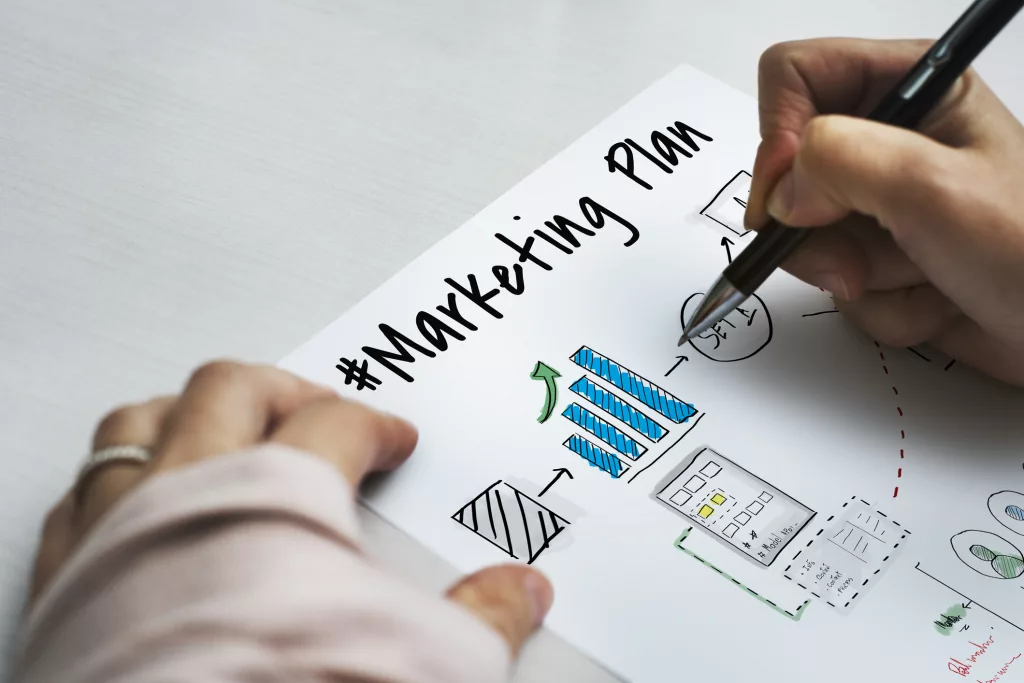TL;DR – Why smaller marketing agencies often win
- Agility: Smaller teams launch campaigns faster with fewer bottlenecks.
- Direct Access: You work with senior strategists and creatives, not just account managers.
- True Partnership: Boutique agencies are more accountable and impact-driven.
- Culture & Collaboration: Less ego, more teamwork, better outcomes.
- Proven Stability: Many small agencies have decades of success and loyal client relationships.
When B2B businesses in manufacturing, tech, or financial services start searching for a marketing partner, the instinct is often to look at the biggest agency in the room. After all, “bigger must mean better,” right?
Not so fast.
In reality, working with a smaller, specialized agency often delivers more value, more creativity, and more measurable results than a sprawling, big-box firm. For brands throughout the Midwest, the advantages of partnering with an agency of 25 people or fewer are clear: agility, direct access to senior talent, and a relationship-first culture that drives better work.
1. Agility that keeps you ahead of the curve
Large agencies are known for long timelines, stacked approval layers, and campaign launches that drag on for months. Smaller agencies? They move fast.
- No bureaucratic bottlenecks.
- Real-time pivots when strategies need tweaking.
- Faster launches that get you to market sooner.
For industries like manufacturing and finance—where competitors adapt quickly—speed matters. A smaller agency can get campaigns live in weeks instead of months.
2. Direct access to senior talent
One of the hidden truths about large agencies is that the people pitching you the business often disappear after the contract is signed. You’re left with a rotating cast of junior staff.
A smaller agency doesn’t have that luxury—or that problem. With a leaner team, your account gets attention from senior strategists, creative directors, and decision-makers from day one.
This means:
- Consistent, high-quality work.
- Faster problem-solving.
- Strategic thinking, not just tactical execution.
In short, no “B team.” Just the team.
3. A culture that fuels creativity
Happy teams do better work. Period.
Agencies recognized as “Best Places to Work” know this well, we speak from experience. A strong internal culture creates an environment where employees feel valued, motivated, and inspired. That culture spills into the client experience—because when your agency team loves what they do, you feel it in every campaign, every brainstorm, every late-night push to hit deadlines.
Smaller agencies often cultivate this culture more naturally. They operate like families, not factories. And that closeness translates into big, bold ideas that resonate with audiences.
4. Personalized partnerships, not vendor relationships
Ever feel like your agency is just… a vendor?
That’s the curse of “too big to care.” With hundreds of clients on the books, larger firms can treat brands like line items. Smaller agencies, on the other hand, invest deeply in understanding your brand, your audience, and your unique challenges.
This level of personalized attention leads to:
- Campaigns that actually resonate with your buyers.
- Messaging that reflects your culture, not an agency’s template.
- A partner that feels like an extension of your team—not an outsider.
When your marketing partner cares about your success as much as you do, you notice.
5. Right-sized teams for right-sized Need
Mid-sized businesses often wrestle with a simple truth: they don’t need a 200-person agency. What they need is a right-sized partner—one that can scale up when needed, but won’t saddle them with overhead or unnecessary services.
A smaller agency structure matches your budget and expectations, without sacrificing results. You get:
- Efficient use of resources.
- Transparent pricing.
- Solutions designed to fit your specific stage of growth.
That’s real value.
6. Results that speak louder than size
The best agencies—large or small—deliver results. But smaller agencies are uniquely positioned to provide accountability and transparency because every project matters to their reputation.
With fewer clients, there’s no hiding behind layers of account teams. Every win (or loss) is visible. That means:
- Detailed reporting and analytics.
- Honest conversations about what’s working (and what’s not).
- A results-first mindset that keeps your goals front and center.
7. Stability through experience
One common concern about smaller agencies is stability. Will they be around next year? Can they handle economic shifts?
Here’s the reality: many smaller, specialized agencies have been around for decades—Littlefield Agency has been serving clients since 1980—adapting through recessions, technology shifts, and changing client needs. Family-led (like us) or independently owned firms often provide a level of continuity and long-term perspective that larger holding-company agencies can’t.
With that comes confidence: you’re not just buying a campaign—you’re building a long-term relationship with a trusted partner.
8. Big impact, no big-agency ego
Finally, let’s address the elephant in the room: ego.
Bigger agencies sometimes approach clients with an air of “you’re lucky to have us.” Smaller agencies don’t have that luxury. They know every client matters, every project builds reputation, and every referral counts.
That humility translates into collaboration, partnership, and creative problem-solving without posturing. In other words: you get the big thinking without the big-agency attitude.
Answering the question: Why choose a smaller agency?
If you’re a CMO, Marketing Director, or business owner asking “Why should I choose a smaller marketing agency over a big one?”, here’s the short answer:
- You’ll get senior-level expertise on every project.
- Your campaigns will launch faster and adapt quicker.
- You’ll build a true partnership, not a transactional relationship.
- You’ll pay for impact, not overhead.
- You’ll work with a team that genuinely cares about your success.
That’s the value of choosing smaller.
Final thoughts
The next time you’re weighing whether to partner with a large agency or a smaller one, remember this: size doesn’t equal strength in marketing.
What matters most is:
- Agility.
- Expertise.
- Culture.
- Partnership.
- Results.
Smaller, specialized agencies deliver all of these—and often more effectively than their larger counterparts. For mid-sized businesses trying to stretch budgets, maximize ROI, and stand out in competitive markets, the smarter move is often the smaller one.
FAQs: Small vs. large marketing agencies
Is a smaller marketing agency better than a large one?
For many businesses, yes. Smaller agencies deliver faster turnaround, direct senior-level involvement, and a more tailored client experience. Large agencies can bring scale, but often add cost and complexity.
What are the benefits of working with a boutique marketing agency?
Benefits include agility, personal attention, cultural alignment, and paying for impact instead of overhead. You’re more likely to get senior-level strategy and execution on every project.
Do smaller agencies have enough stability and resources?
Many boutique agencies have decades of experience and established teams. Their smaller size doesn’t mean instability — it often means leaner, more efficient operations.
When should I consider a large agency instead?
If you need global scale, dozens of specialists under one roof, or massive media buying power, a large agency may be a fit. But for most mid-market and growth-oriented brands, a smaller agency is more effective.
How do I know if a smaller agency is right for my brand?
Look at their track record, client roster, and culture. If they show proven results, long-term relationships, and alignment with your brand values, they’re likely a strong partner.




